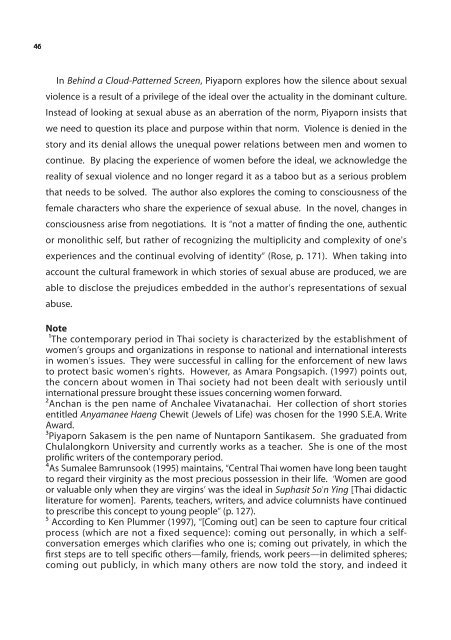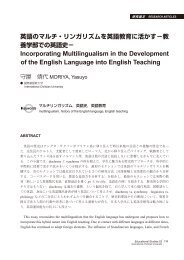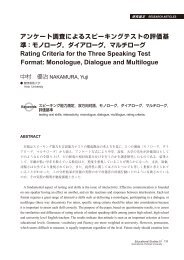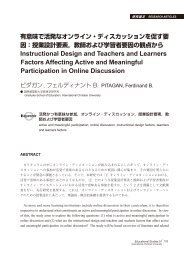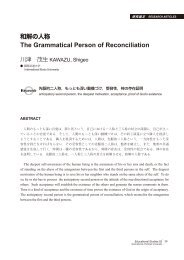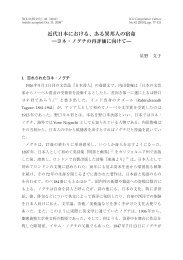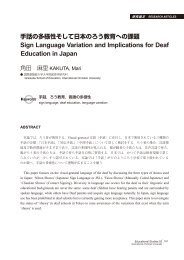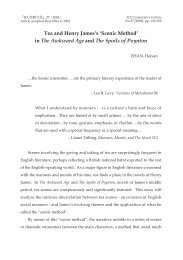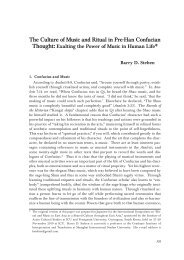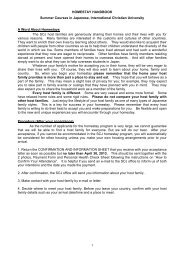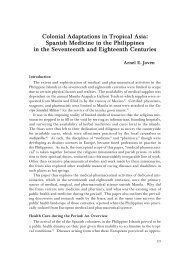Untitled - subsite - å½éåºç£æ大å¦
Untitled - subsite - å½éåºç£æ大å¦
Untitled - subsite - å½éåºç£æ大å¦
You also want an ePaper? Increase the reach of your titles
YUMPU automatically turns print PDFs into web optimized ePapers that Google loves.
46<br />
In Behind a Cloud-Patterned Screen, Piyaporn explores how the silence about sexual<br />
violence is a result of a privilege of the ideal over the actuality in the dominant culture.<br />
Instead of looking at sexual abuse as an aberration of the norm, Piyaporn insists that<br />
we need to question its place and purpose within that norm. Violence is denied in the<br />
story and its denial allows the unequal power relations between men and women to<br />
continue. By placing the experience of women before the ideal, we acknowledge the<br />
reality of sexual violence and no longer regard it as a taboo but as a serious problem<br />
that needs to be solved. The author also explores the coming to consciousness of the<br />
female characters who share the experience of sexual abuse. In the novel, changes in<br />
consciousness arise from negotiations. It is not a matter of finding the one, authentic<br />
or monolithic self, but rather of recognizing the multiplicity and complexity of one's<br />
experiences and the continual evolving of identity (Rose, p. 171). When taking into<br />
account the cultural framework in which stories of sexual abuse are produced, we are<br />
able to disclose the prejudices embedded in the authors representations of sexual<br />
abuse.<br />
Note<br />
¹The contemporary period in Thai society is characterized by the establishment of<br />
womens groups and organizations in response to national and international interests<br />
in womens issues. They were successful in calling for the enforcement of new laws<br />
to protect basic womens rights. However, as Amara Pongsapich. (1997) points out,<br />
the concern about women in Thai society had not been dealt with seriously until<br />
international pressure brought these issues concerning women forward.<br />
²Anchan is the pen name of Anchalee Vivatanachai. Her collection of short stories<br />
entitled Anyamanee Haeng Chewit (Jewels of Life) was chosen for the 1990 S.E.A. Write<br />
Award.<br />
³Piyaporn Sakasem is the pen name of Nuntaporn Santikasem. She graduated from<br />
Chulalongkorn University and currently works as a teacher. She is one of the most<br />
prolific writers of the contemporary period.<br />
⁴As Sumalee Bamrunsook (1995) maintains, Central Thai women have long been taught<br />
to regard their virginity as the most precious possession in their life. Women are good<br />
or valuable only when they are virgins was the ideal in Suphasit Son Ying [Thai didactic<br />
literature for women]. Parents, teachers, writers, and advice columnists have continued<br />
to prescribe this concept to young people (p. 127).<br />
⁵ According to Ken Plummer (1997), [Coming out] can be seen to capture four critical<br />
process (which are not a fixed sequence): coming out personally, in which a selfconversation<br />
emerges which clarifies who one is; coming out privately, in which the<br />
first steps are to tell specific othersfamily, friends, work peersin delimited spheres;<br />
coming out publicly, in which many others are now told the story, and indeed it


